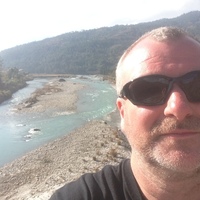StuART Marks
The Australian National University, Health and Medicine, Graduate Student
- Mental Health in the Music Industry, Medicine Music, Exploring Ego and constructions of self, Entheogenic Healing rituals and practices, Communitas, Liminality, and 49 moreFlow, Pierre Bourdieu, Victor Turner, Eckhart Tolle, Mihaly Csikszentmihalyi, Structural Violence, Didier Fassin, Anthropology, Music and Mental Health, David Harvey, Anthropology of Music, Cultural Musicology, Ethnomusicology, Sociology of Music, Popular Music Studies, Sound healing, Sound Therapy, Psychedelic therapy, Psychedelics, Multidisciplinary Association for Psychedelic Studies, Psychedelics (Psychology), Transpersonal Psychology, Transpersonal Counseling, Holistic counselling, Vaccines, Vaccinations, Culture of Fear, Risk Governance, Crisis Capitalism, Moral Panic, Moral panics and the media, Anthropology of Shamanism, Anthropology of Fear, Anthropology of Police & Policing, Sociology of Risk, Swami Sivananda, Music, Sociology, Social and Cultural Anthropology, Critical Medical Anthropology, Medical Anthropology, Anti-Vaccination Movement, Vaccination and anti-vaccination, Sociology of Health and Illness, Cryptocurrency, NFT Marketplace, Streaming Music, Medical Ethnomusicology, and Arts and Music for Health and Wellbeingedit
- Masters (with Class 1 Honours) Culture, Health and Medicine from ANU. Candidate for Phd in Anthropology (on leave), Undertaking Diploma in Sound Healing, .edit
Ice, the most common name given to the illicit substance crystal methamphetamine, has been presented as a drug having catastrophic effects on people’s health on a global scale. Political rhetoric, incessant media reports and scholarly... more
Ice, the most common name given to the illicit substance crystal methamphetamine, has been presented as a drug having catastrophic effects on people’s health on a global scale. Political rhetoric, incessant media reports and scholarly literature from biomedicine and public health construct a portrait of the out of control, violent ice user falling victim to an exceptional evil substance that is unlike any other. This thesis argues that the ice epidemic has been constructed through a moral panic fuelled by these accounts and that it is the most recent in a series of drug panics that have occurred in the past one hundred and fifty years. Taking a historical perspective reveals that these panics feature similar political and media rhetoric, utilise biomedicine and public health as expert justification, are often connected to hidden forms of violence and influenced by the dominant political agenda of the period. The ice epidemic is shaped by the current neoliberal mode of governance that produces an intensified version of previous drug panics. Neoliberal policies resulting in unemployment, the privatisation and de-centralisation of health and social services and promotion of individual freedoms within the global market are reflected in current biomedical and public health approaches to ice dependence. This thesis concludes that the current drug panic on ice is not exceptional, and is a product of a historical series of drug panics reproduced through a dominant class based neoliberal ideology that intensifies surveillance on and control of the lower class drug consumers, whist insulating the upper/middle class from the same scrutiny.
Research Interests:
Background and objectives Rural clinical schools (RCSs) help address Australia's rural workforce shortfall, but they require an investment by rural clinicians and communities. Our objective was to determine the location of RCS graduates... more
Background and objectives Rural clinical schools (RCSs) help address Australia's rural workforce shortfall, but they require an investment by rural clinicians and communities. Our objective was to determine the location of RCS graduates as one measure of the effectiveness of RCSs.
